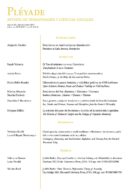Contingency, Democracy, and Neoliberalism: Reflections and Tensions from the Feminist Movement Today. Interview with Verónica Schild

Published 2018-12-23
Keywords
- Feminism,
- Neoliberalism,
- Transition to democracy,
- Gender,
- Left
How to Cite

This work is licensed under a Creative Commons Attribution-NonCommercial 4.0 International License.
Abstract
The history and analysis of the feminist movement in the last 30 years has become unavoidable in the current Latin American context, fraught with feminist scenes that are disruptive in relation to the official narrative of the movement. With this, the need arises to critically understand the past of the movement, the processes of institutionalization, and the gender agenda implemented in the 90’, as well as to develop new tools and theoretical analyses that account for the current needs of the movement. In the wake of these phenomena, Veronica Schild, a feminist academic and researcher, offers a critical reading related to three axes inevitable for the development of a current feminist thought: to understand the density and diversity of feminism as opposed to a single, homogeneous reading; the particular cross between neoliberalism and transition to democracy from feminist analyses; and finally, to understand the current effects of state policies related to women, family, and care. Schild’s perspective transversally establishes a reading that remarks –from feminism– the capitalist model of dispossession, raising its social and ecological limits in contexts in which entire communities are affected, accentuating its violence in rural spaces and indigenous communities, particularly for women and women’s bodies. As a response, Schild asks about the current possibilities of rethinking the theoretical keys of feminism, discussing the resources of the feminist tradition of Marxism and socialism.